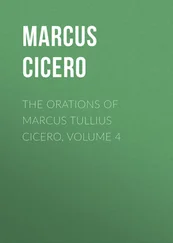Marcus Cicero - The Letters of Cicero, Volume 1
Здесь есть возможность читать онлайн «Marcus Cicero - The Letters of Cicero, Volume 1» — ознакомительный отрывок электронной книги совершенно бесплатно, а после прочтения отрывка купить полную версию. В некоторых случаях можно слушать аудио, скачать через торрент в формате fb2 и присутствует краткое содержание. Жанр: foreign_antique, Философия, foreign_edu, на английском языке. Описание произведения, (предисловие) а так же отзывы посетителей доступны на портале библиотеки ЛибКат.
- Название:The Letters of Cicero, Volume 1
- Автор:
- Жанр:
- Год:неизвестен
- ISBN:нет данных
- Рейтинг книги:4 / 5. Голосов: 1
-
Избранное:Добавить в избранное
- Отзывы:
-
Ваша оценка:
- 80
- 1
- 2
- 3
- 4
- 5
The Letters of Cicero, Volume 1: краткое содержание, описание и аннотация
Предлагаем к чтению аннотацию, описание, краткое содержание или предисловие (зависит от того, что написал сам автор книги «The Letters of Cicero, Volume 1»). Если вы не нашли необходимую информацию о книге — напишите в комментариях, мы постараемся отыскать её.
The Letters of Cicero, Volume 1 — читать онлайн ознакомительный отрывок
Ниже представлен текст книги, разбитый по страницам. Система сохранения места последней прочитанной страницы, позволяет с удобством читать онлайн бесплатно книгу «The Letters of Cicero, Volume 1», без необходимости каждый раз заново искать на чём Вы остановились. Поставьте закладку, и сможете в любой момент перейти на страницу, на которой закончили чтение.
Интервал:
Закладка:
My own position is this: with the loyalists I hold the same place as when you left town, with the tagrag and bobtail of the city I hold a much better one than at your departure. For it does me no harm that my evidence appears not to have availed. Envy has been let blood without causing pain, and even more so from the fact that all the supporters of that flagitious proceeding confess that a perfectly notorious fact has been hushed up by bribing the jury. Besides, the wretched starveling mob, the blood-sucker of the treasury, imagines me to be high in the favour of Magnus—and indeed we have been mutually united by frequent pleasant intercourse to such an extent, that our friends the boon companions of the conspiracy, the young chin-tufts, speak of him in ordinary conversation as Gnæus Cicero. Accordingly, both in the circus and at the gladiatorial games, I received a remarkable ovation without a single cat-call. There is at present a lively anticipation of the elections, in which, contrary to everybody's wishes, our friend Magnus is pushing the claims of Aulus's son; 105and in that matter his weapons are neither his prestige nor his popularity, but those by which Philip said that any fortress could be taken—if only an ass laden with gold could make its way up into it. Farthermore, that precious consul, playing as it were second fiddle to Pompey, 106is said to have undertaken the business and to have bribery agents at his house, which I don't believe. But two decrees have already passed the house of an unpopular character, because they are thought to be directed against the consul on the demand of Cato and Domitius 107—one that search should be allowed in magistrates' houses, and a second, that all who had bribery agents in their houses were guilty of treason. The tribune Lurco also, having entered on his office irregularly in view of the Ælian law, has been relieved from the provisions both of the Ælian and Fufian laws, in order to enable him to propose his law on bribery, which he promulgated with correct auspices though a cripple. 108Accordingly, the comitia have been postponed to the 27th of July. There is this novelty in his bill, that a man who has promised money among the tribes, but not paid it, is not liable, but, if he has paid, he is liable for life to pay 3,000 sesterces to each tribe. I remarked that P. Clodius had obeyed this law by anticipation, for he was accustomed to promise, and not pay. But observe! Don't you see that the consulship of which we thought so much, which Curio used of old to call an apotheosis, if this Afranius is elected, will become a mere farce and mockery? Therefore I think one should play the philosopher, as you in fact do, and not care a straw for your consulships!
You say in your letter that you have decided not to go to Asia. For my part I should have preferred your going, and I fear that there may be some offence 109given in that matter. Nevertheless, I am not the man to blame you, especially considering that I have not gone to a province myself. I shall be quite content with the inscriptions you have placed in your Amaltheium, 110especially as Thyillus has deserted me and Archias written nothing about me. The latter, I am afraid, having composed a Greek poem on the Luculli, is now turning his attention to the Cæcilian drama. 111I have thanked Antonius on your account, and I have intrusted the letter to Mallius. I have heretofore written to you more rarely because I had no one to whom I could trust a letter, and was not sure of your address. I have puffed you well. If Cincius should refer any business of yours to me, I will undertake it. But at present he is more intent on his own business, in which I am rendering him some assistance. If you mean to stay any length of time in one place you may expect frequent letters from me: but pray send even more yourself. I wish you would describe your Amaltheium to me, its decoration and its plan; and send me any poems or stories you may have about Amaltheia. 112I should like to make a copy of it at Arpinum. I will forward you something of what I have written. At present there is nothing finished.
XXII (a i, 17)
TO ATTICUS (IN EPIRUS)
Rome, 5 December
b.c. 61, æt. 45
Your letter, in which you inclose copies of his letters, has made me realize that my brother Quintus's feelings have undergone many alternations, and that his opinions and judgments have varied widely from time to time. 113This has not only caused me all the pain which my extreme affection for both of you was bound to bring, but it has also made me wonder what can have happened to cause my brother Quintus such deep offence, or such an extraordinary change of feeling. And yet I was already aware, as I saw that you also, when you took leave of me, were beginning to suspect, that there was some lurking dissatisfaction, that his feelings were wounded, and that certain unfriendly suspicions had sunk deep into his heart. On trying on several previous occasions, but more eagerly than ever after the allotment of his province, to assuage these feelings, I failed to discover on the one hand that the extent of his offence was so great as your letter indicates; but on the other I did not make as much progress in allaying it as I wished. However, I consoled myself with thinking that there would be no doubt of his seeing you at Dyrrachium, or somewhere in your part of the country: and, if that happened, I felt sure and fully persuaded that everything would be made smooth between you, not only by conversation and mutual explanation, but by the very sight of each other in such an interview. For I need not say in writing to you, who know it quite well, how kind and sweet-tempered my brother is, as ready to forgive as he is sensitive in taking offence. But it most unfortunately happened that you did not see him anywhere. For the impression he had received from the artifices of others had more weight with him than duty or relationship, or the old affection so long existing between you, which ought to have been the strongest influence of all. And yet, as to where the blame for this misunderstanding resides, I can more easily conceive than write: since I am afraid that, while defending my own relations, I should not spare yours. For I perceive that, though no actual wound was inflicted by members of the family, they yet could at least have cured it. But the root of the mischief in this case, which perhaps extends farther than appears, I shall more conveniently explain to you when we meet. As to the letter he sent to you from Thessalonica, 114and about the language which you suppose him to have used both at Rome among your friends and on his journey, I don't know how far the matter went, but my whole hope of removing this unpleasantness rests on your kindness. For if you will only make up your mind to believe that the best men are often those whose feelings are most easily irritated and appeased, and that this quickness, so to speak, and sensitiveness of disposition are generally signs of a good heart; and lastly—and this is the main thing—that we must mutually put up with each other's gaucheries (shall I call them?), or faults, or injurious acts, then these misunderstandings will, I hope, be easily smoothed away. I beg you to take this view, for it is the dearest wish of my heart (which is yours as no one else's can be) that there should not be one of my family or friends who does not love you and is not loved by you.
That part of your letter was entirely superfluous, in which you mention what opportunities of doing good business in the provinces or the city you let pass at other times as well as in the year of my consulship: for I am thoroughly persuaded of your unselfishness and magnanimity, nor did I ever think that there was any difference between you and me except in our choice of a career. Ambition led me to seek official advancement, while another and perfectly laudable resolution led you to seek an honourable privacy. In the true glory, which is founded on honesty, industry, and piety, I place neither myself nor anyone else above you. In affection towards myself, next to my brother and immediate family, I put you first. For indeed, indeed I have seen and thoroughly appreciated how your anxiety and joy have corresponded with the variations of my fortunes. Often has your congratulation added a charm to praise, and your consolation a welcome antidote to alarm. Nay, at this moment of your absence, it is not only your advice—in which you excel—but the interchange of speech—in which no one gives me so much delight as you do—that I miss most, shall I say in politics, in which circumspection is always incumbent on me, or in my forensic labour, which I formerly sustained with a view to official promotion, and nowadays to maintain my position by securing popularity, or in the mere business of my family? In all these I missed you and our conversations before my brother left Rome, and still more do I miss them since. Finally, neither my work nor rest, neither my business nor leisure, neither my affairs in the forum or at home, public or private, can any longer do without your most consolatory and affectionate counsel and conversation. The modest reserve which characterizes both of us has often prevented my mentioning these facts; but on this occasion it was rendered necessary by that part of your letter in which you expressed a wish to have yourself and your character "put straight" and "cleared" in my eyes. Yet, in the midst of all this unfortunate alienation and anger, there is one fortunate circumstance—that your determination of not going to a province was known to me and your other friends, and had been at various times before distinctly expressed by yourself; so that your not being his guest may be attributed to your personal tastes and judgments, not to the quarrel and rupture between you. And so those ties which have been broken will be restored, and ours which have been so religiously preserved will retain all their old inviolability.
Читать дальшеИнтервал:
Закладка:
Похожие книги на «The Letters of Cicero, Volume 1»
Представляем Вашему вниманию похожие книги на «The Letters of Cicero, Volume 1» списком для выбора. Мы отобрали схожую по названию и смыслу литературу в надежде предоставить читателям больше вариантов отыскать новые, интересные, ещё непрочитанные произведения.
Обсуждение, отзывы о книге «The Letters of Cicero, Volume 1» и просто собственные мнения читателей. Оставьте ваши комментарии, напишите, что Вы думаете о произведении, его смысле или главных героях. Укажите что конкретно понравилось, а что нет, и почему Вы так считаете.












